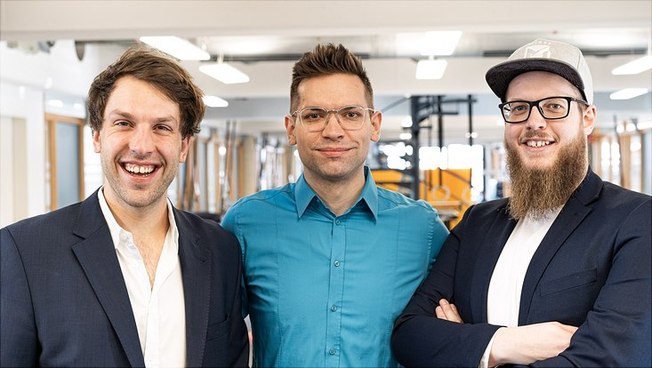Digital learning applications are becoming increasingly important. This is also illustrated by the ongoing pandemic. Educational institutions are not only facing the challenge of Corona: learning materials are often not up to date, inclusive or they do not exploit the possibilities of digitalisation. This is where the neurodactics team comes in and develops the inclusive maths app Mambio, which enables tailor-made learning in and in addition to the classroom. The project by Torben Rieckmann, Christopher Hof and Jonas Vierth emerged from research on inclusive digital learning applications at the Faculty of Education.
The idea: A learning app for all
Torben Rieckmann came up with the idea for the app, which is intended to provide digital support for children in mental arithmetic and quantity comprehension, while addressing each individual. He has lived in Hamburg since 2008 and studied special education. As a research assistant at the Faculty of Education, he conducted research on learning support for children with trisomy 21, finding out that people with trisomy 21 can process fewer things simultaneously than people with average brains. "This has an impact on the processing of the environment and learning. Especially in mathematics, this has to be taken into account," the scientist reports. For this reason, during his doctorate he developed the "mathildr" system, a learning system that introduces pupils to the number range from 0 to 20 with a special representation of quantities. This system has already received several awards. The associated learning materials are now used in schools worldwide. There was a desire for an app that would enable children to work independently with the system without the need for trained staff to guide them.
"Our app Mambio is designed to give children an understanding of quantities and to encourage them in mental arithmetic. It is designed to be inclusive, so it is aimed at all children. It doesn't matter whether they have a dyscalculia or disability, are average learners or highly gifted," Torben reports. The programme is initially designed for first grade students: "Unlike workbooks and other non-digital learning materials, we can programme applications in such a way that almost no preparation and instruction in class are necessary. The app is developed together with the target group and can be used at school or at home. We give teachers the opportunity to support their students individually in mathematics lessons. In this way, we want to contribute to equal opportunities in education. In recent years, there have been a number of innovations that promote social inclusion, but I see a lot of catching up to do in the school sector. Especially in the primary school sector. We need significantly more start-ups that support teachers and other educators in creating educational equity."
The founding support
Digital learning applications are becoming increasingly important. This is also illustrated by the ongoing pandemic. Educational institutions are not only facing the challenge of Corona: learning materials are often not up to date, inclusive or they do not exploit the possibilities of digitalisation. This is where the neurodactics team comes in and develops the inclusive maths app Mambio, which enables tailor-made learning in and in addition to the classroom. The project by Torben Rieckmann, Christopher Hof and Jonas Vierth emerged from research on inclusive digital learning applications at the Faculty of Educatio
Necessary expertise
The contact with his business economist came about through the choir in which he sings in his spare time. Torben's strategy is to communicate his idea aggressively in the hope of making useful contacts here and there: "I've told everyone that I'm looking for people - I can highly recommend that!" That's how Jonas Vierth came to join, he is the son of a choir member. The Hamburg native studied economics and then did a Master's in Finance at the University of Applied Sciences in Wedel: "It just fit!" says Torben.
Torben found the computer scientist Christopher Hof right next door: "We are neighbours! Chris told me that he develops mobile apps. I told him about my idea and he was immediately interested," the founder describes. Christopher studied media informatics at the University of Kaiserslautern and has a Bachelor of Science. He originally came to Hamburg to work in a start-up that develops software for internal communication and collaboration for companies: "I always wanted to found a company myself, but was unsure about the content and wanted to wait for the right idea. And Torben simply had the right idea. For me, this also means a personal risk, because I had to give up my existing job. However, I am happy to take this risk because I am convinced of our idea and our team," says Christopher confidently.
Outlook
"Fortunately, the three of us hit it off right away and have grown together as a team over the last few months. Everyone contributes their expertise, but also looks outside the box to learn from the others. In the beginning, it was my idea how the project should be set up. With their professional input, it really became our project. Everyone has equal shares and equal say," Torben reports. "To hire more people we need more money. At the moment, UI artist Thomas Hollnack is designing our app for a fee," Jonas adds: "At the moment, we are in a good position to survive: In the medium term, however, we will need a larger investor to be able to master the challenges that lie ahead."
Torben is also optimistic about the future: "Since we develop Mambio in close cooperation with the target group, we constantly receive feedback from children. The feedback is impressive: Although the app is not yet finished, it is very motivating and leads to learning successes. That's why we are very confident about our app release."
https://neurodactics.com/
